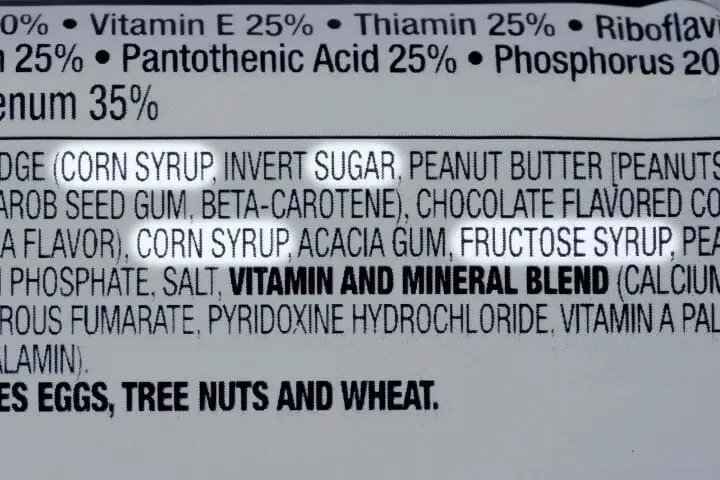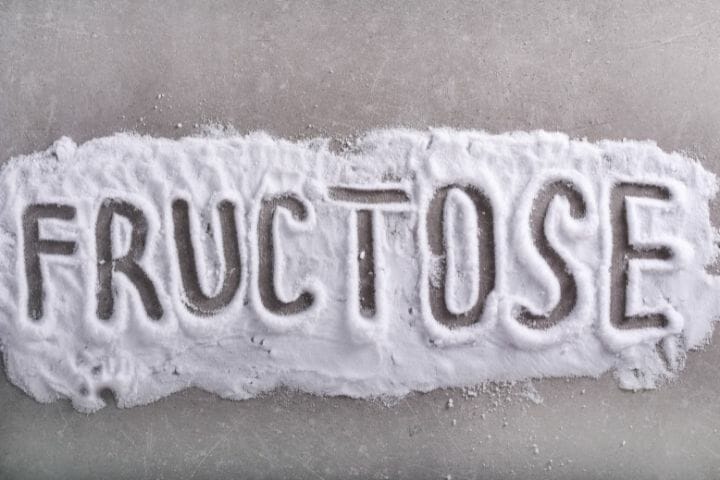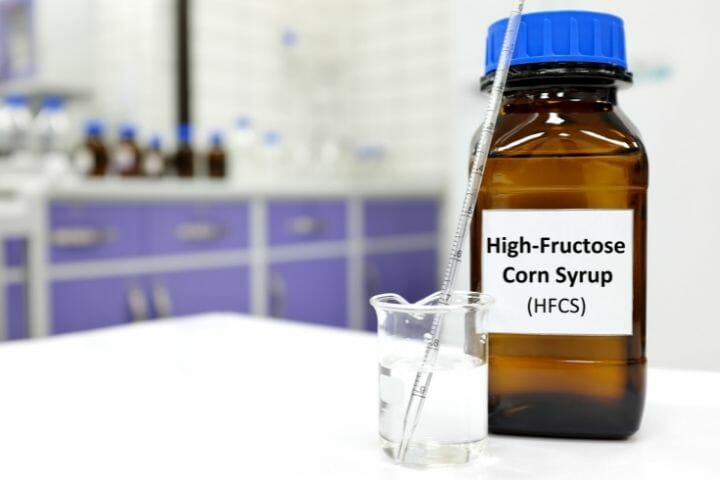Fructose’s impact on human health has long been a matter of debate. But why is fructose bad for you? Processed foods, which often include sugar and high fructose corn syrup, are to be blamed for this.
Contents
Obesity, diabetes, nonalcoholic fatty liver disease, and many other chronic health problems have been linked to fructose during the past few decades.
However, most of these debates are based on exaggeration and exaggeration alone. We discuss below whether fructose is actually harmful to your health or not.

What is Fructose?
It’s a form of sugar present in all fruits and several vegetables and honey; it’s also contained in table sugar. Fructose is present in fruits, but they are low in calories and high in fiber, making them a healthy choice. Even so, fruits include less high fructose corn syrup. Thus they aren’t as bad for you.
As with glucose, fructose is a single-component carbohydrate (called monosaccharides). In contrast to glucose, fructose is structurally distinct, and as a result, the body responds and processes it differently.
Chemically, fructose differs from glucose in several ways. The liver can get overwhelmed with fructose after consuming high-fructose meals. The liver breaks down fructose into fat, increasing body fat.
The liver converts some of it to lactate and excretes it, while the rest is used for further cellular metabolism. As a result, only a tiny percentage of the calories consumed are transformed into fat and stored in the body.
In the body, both fructose and glucose provide fuel. The two forms of sugar, sucrose and table sugar, are made by combining these two chemicals. Fructose is primarily used as a source of energy for the body.
What is High-Fructose Corn Syrup?
High fructose corn syrup is made by adding enzymes to maize starch, effectively pure glucose and sugar. They then combine this glucose with fructose to make a syrup with different fructose levels.
Depending on the brand, high fructose corn syrup may include as much as 42-55% fructose and the rest as glucose. Since table sugar is 50% fructose and 50 % glucose, sugar has a slightly higher high fructose corn syrup concentration.
Honey is another frequent ingredient in cuisine recipes. A 1:1 ratio of fructose to glucose is common in honey as well. High fructose corn syrup is a sweetener used in various processed foods, including candy, baked goods, soda, and other drinks.

Is it Harmful to Consume fructose?
As part of a well-balanced diet, fructose, which comes from honey and fruits, may actually be beneficial. However, processed forms of fructose, such as high fructose corn syrup, should be restricted in your diet. According to many studies, this form of fructose has negative effects on health, which we have detailed below.
Obesity
Fructose consumption may increase the risk of obesity and associated disorders, including metabolic syndrome, according to a research analysis published in 2017. Fructose may also affect how the body breaks down fats and carbs, leading to an increased risk of obesity.
It is also possible that fructose intake might increase the amount of food consumed since it does not make individuals feel full.
Some Alarming Obesity Statistics and Facts Related to Fructose
- Excessive intake of fructose in the diet has been linked to insulin resistance, according to a study published in 2017.
- Glucose may build up in the blood due to insulin resistance, which can lead to various health issues, including type 2 diabetes.
- Similar findings were reported in research conducted in 2016. Study participants in Taiwan were 12–16 years old, and the researchers looked at the impact of drinking fructose-rich beverages on their health.
- Individuals with a larger intake of fructose-rich beverages were shown to have increased insulin resistance.

Fatty Liver Disease
Fructose intake may raise the risk of nonalcoholic fatty liver disease, according to the National Institute of Health (NIH). When this occurs, the body’s liver cells overflow with fat. However, the research on this association is sketchy; some researchers have found a positive correlation, whereas others have found no evidence.
Nonalcoholic steatohepatitis (NASH) is another dangerous disorder that may cause liver damage and inflammation and is caused by excess fructose. Other disorders that are related to the liver include:
- Hepatic fibrosis
- Liver disease
- Hepatic failure
- Colorectal cancer
A 2021 study on mice indicated that excessive fructose consumption might lead to tumor development in the intestines.
Similar results were found in a 2019 source, which was also conducted on mice. High fructose corn syrup makes intestinal cancers more aggressive and accelerates their growth in mice, but researchers were unsure why.
According to more recent research, fructose did not speed up tumor cell growth but rather prolonged tumor cell survival. Fructose was also shown to increase the risk of anemia in mice with colon cancer, linked to a shorter survival rate in both mice and people who suffer from the disease. However, additional human research is needed to prove cancer enhancing properties of fructose.
You might like to read: How Much Sugar is Enough as You Age?
Is Fructose Really That Bad? Contradictory Proof
Fructose has been shown to have harmful health impacts, although studies have difficulty separating the effects of fructose from other sugar in the diet.
Fructose is often found in meals with high quantities of other sugars, such as glucose, so they tend to have high fructose content. Many investigations are done on the effects of fructose on rats given a variety of sugars by scientists.
Compared to other forms of sugar, fructose does not induce weight gain, according to a study published in 2014 in the scientific literature. While sugar-sweetened beverages do contain fructose, the authors contend that they are rich in calories because of the added sugars they add. Fructose and obesity have been linked in the past.
According to the FDA, there is presently no evidence that foods containing high fructose corn syrup are less safe than other foods containing comparable sweeteners, such as sucrose and honey, at this time. Therefore, even though it is the most contentious fructose-containing product, the FDA says high fructose corn syrup is safe to consume in moderation.

A Comparison between Fructose and Glucose
The common table sugar produces sucrose when fructose binds to glucose. Glucose, as opposed to fructose, is mostly broken down in the cells by the body. This sugar is normally absorbed by the small intestine and used as energy by the body’s cells. Therefore, fructose is more readily digested when combined with glucose than when consumed on its own.
Insulin, a hormone that helps cells to utilize glucose as a source of energy, is released by the pancreas when glucose is consumed. However, Leptin, a hormone that signals a person that they’ve eaten enough, is not released in response to eating fructose.
It also does not affect the hormones that alert the body to hunger. This is why a fructose-heavy diet causes higher weight gain than a glucose-heavy diet.
In a study published in the NIH news archives in 2017, Mice on a low-fat diet were divided into two groups. Both glucose and fructose were given to the two groups.
The mice in both groups gained weight at the same rate. However, when fed a fructose-enriched high-fat meal, rats gained considerably more weight than mice given the same diet but without the fructose addition.
Foods containing glucose-heavy carbohydrates nevertheless have calories, which you should always keep in mind. Weight gain and other health issues might result from consuming too many calories, whether it be from fructose or glucose.
Which Foods Contain Fructose?
Naturally occurring caloric sweetener fructose has a very high sweetness level. Some vegetables and fruits may also be a source of it. Pure fructose is also much sweeter than other sugars. Humans may consume less fructose than other sugars to have the same sweetness.
Foods that include both naturally occurring and high fructose corn syrup contain sugar. Both are digested in the same manner by the body. Fructose or fructans, which are long chains of fructose, are found in a variety of natural foods. Among the most common sources of fructose are:
- Syrup made from the agave plant
- Juice made from apples
- Apples
- Caramel
- Figs that have been dried
- Honey
- Licorice
- Molasses
- Pears
- Prunes
- Sorghum
Fructose is present in certain plants, albeit at much lower concentrations than in fruits. These are only a few examples:
- Asparagus
- Root vegetable chicory
- Artichokes from the Holy Land
- Leeks
- Onions

Processed food contains fructose
The following sweeteners should be avoided by anybody trying to cut down on their consumption of dietary fructose and fructans:
- High-fructose corn syrup
- Caramel
- Honey
- Molasses
- Palm sugar
You might like to read: Coconut Palm Sugar – A Healthier Choice?
Wrap Up
Fructose is a sweetener often used by food manufacturers, yet it is devoid of nutrition.
Many fruits and vegetables naturally contain fructose, which may be included as part of a healthful diet. Adding fructose to food is permitted by the Food and Drug Administration (FDA).
Even though there isn’t enough data to suggest that this sugar is less safe than sucrose or honey, the organization nonetheless advises people to control their intake of all added sugars.

Consumption of high-fructose foods, such as sugar-sweetened drinks may lead to weight gain because of the additional calories they contain. Because fructose is not essential for human survival, you don’t need to consume it daily.
We hope this informative article about fructose and its harms/benefits and the debate around how much damage it can cause was useful to your understanding of this naturally found sugar. If you have some queries, questions, or comments, please feel free to add them to the comments section, and we will respond back quickly. Do also like and share the article on social media so that others can benefit from the knowledge contained herein.
